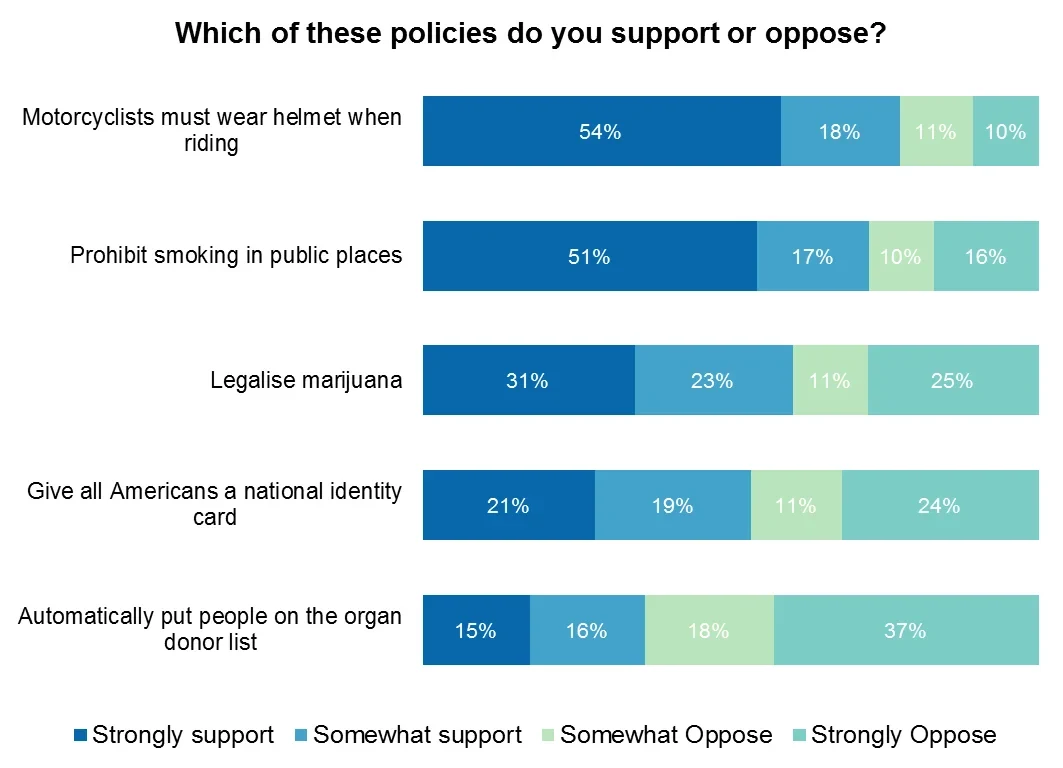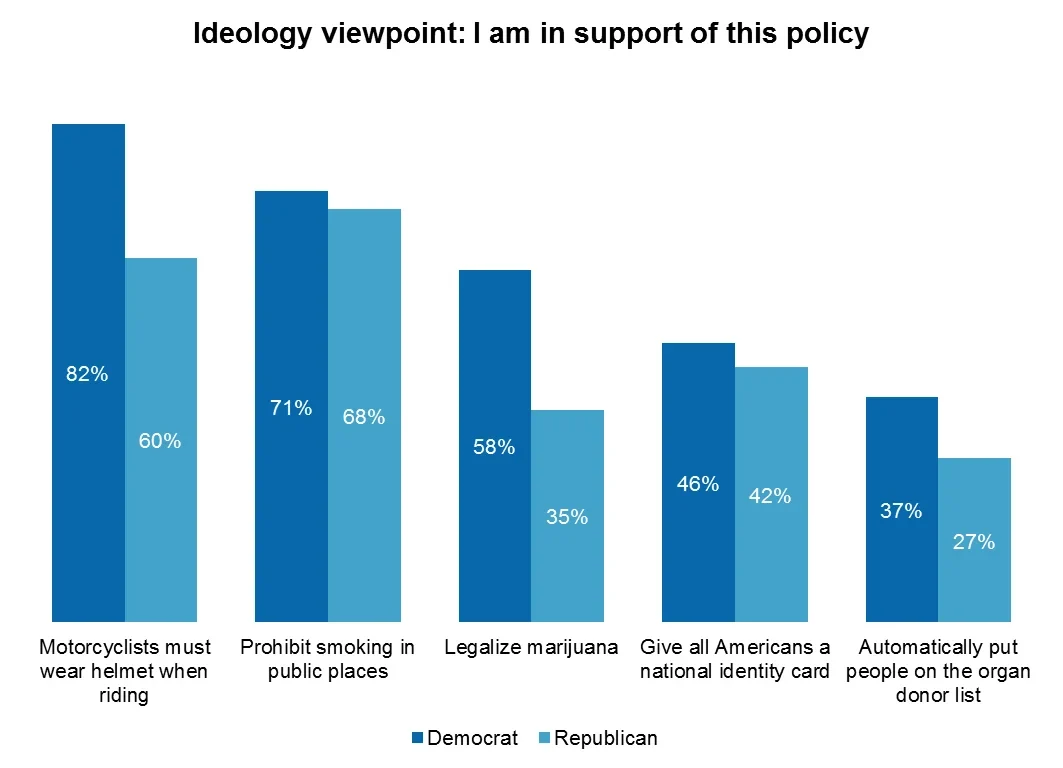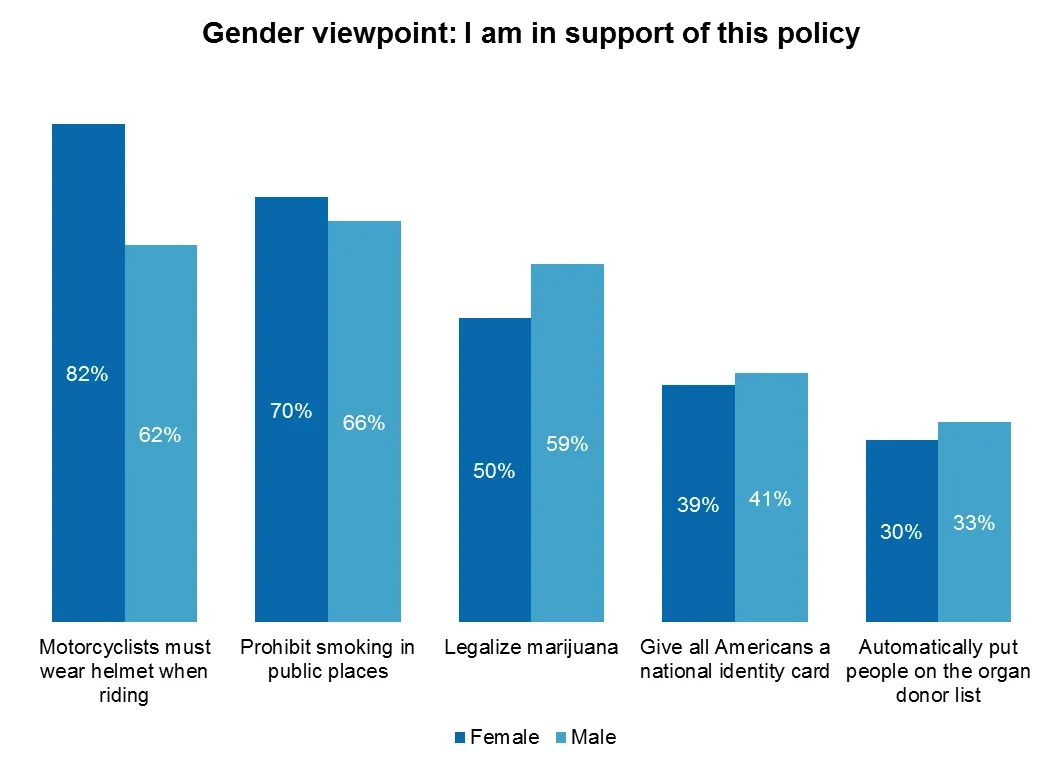There are some laws that will never be taken seriously – like a compulsory 4-day week, bringing your pet to work day, or free coffees for commuters. But there are some (slightly less silly) policies that have the support of thousands of Americans – yet never make it into law. YouGov has asked its nationally representative panel of Americans about a selection of policies if they should be legislated on across the US:
- 72% say motorcyclists should have to wear a helmet when riding
- 68% want smoking prohibited in public places like restaurants and offices
- Should marijuana be legalized? 54% support and 36% oppose
- 40% say all Americans should carry a national identity card
- 55% oppose a policy automatically placing citizens on an organ donor list
To make a policy into law, getting the support of the majority of the population is not even half the battle. In any given two-year session of Congress, 10,000 or more bills are introduced and only about 4% of them are ratified. Most bills that are drafted get struck down at some point in the legislative process – including committee, debates, voting, referral, conference and approval stages – as it needs support at every stage in order to be passed, and opposition at just one stage to be shelved.
It is what safeguards America’s constitutional democracy – but also renders making changes almost impossible. According to Library of Congress data, 132 measures have made it into law in the 112th Congress so far out of the thousands of measures introduced. And of these, almost 20% were to approve official names for post offices. Although the majority of Americans supported three of the policies surveyed – motorcyclists wearing a helmet, prohibiting smoking in public places and legalizing marijuana – the likelihood of them being made into law is uncertain.

MAINLY SUPPORT : Majority say motorcyclists should wear a helmet
72% of Americans think motorcyclists should legally have to wear a helmet when riding, while 21% of the population opposes this policy. Currently the only US states with no helmet law are Iowa, New Hampshire and Illinois. Most states have optional limited laws, such as in North Dakota where under-18s have to wear a helmet, and in Arkansas which requires protective eyewear. Motorcycle helmet laws became widespread during the 1960s, but in 1976 states successfully lobbied Congress to get rid of financial penalties for states not complying to federal law. In April 2012, Michigan Governor Rick Snyder used the lack of financial penalties to make motorcycle helmets optional in the state.
The policy is backed by respondents across the US regions, although there was a significant gender divide – 82% of women support compulsory helmets and only 62% of men. A major body in support of the law is the National Highway Traffic Safety Administration, which found from crash statistics that helmets are 29% effective in preventing fatalities among motorcyclists.
Opponents of mandatory motorcycle helmet laws have suggested that helmets may increase a rider’s risk of crash by interfering with the ability to see and hear surrounding traffic. Another argument is that regulating a helmet law at federal level would encroach on state governance. And national bikers associations including American Bikers Aim Toward Education (ABATE) and the American Motorcyclist Association (AMA) have voiced their opposition to compulsory helmet legislation, citing that riders should be given a choice.
MAINLY SUPPORT : Smoke free law gets popular approval
Half of US states have comprehensive laws that ban smoking in public places. This figure corresponds with support for the policy – 51% of Americans strongly support a restriction on smoking in public areas like bars, offices and restaurants. Aside from the fact many non-smokers dislike the smell and image of people smoking in their vicinity, research by the Department of Health has found that inhaling second hand smoke is damaging to people’s health.
But many smokers find bans in public places restrictive – especially if they have nowhere to smoke while at work, or are required to smoke in their home. Bars and restaurants have also complained that their business has declined due to the smoking ban, as smokers find somewhere else to socialize while lighting up a cigarette. However, only 26% say that smoking should not be banned in public places (and 16% strongly oppose) while 68% are in overall support. There is a significant income divide when it comes to the smoking ban – 83% earning more than $100,000 support a ban compared with 63% earning less than $40,000.
DIVIDED: 54% would legalize marijuana
A YouGov/Economist poll from February 2011 found that more than a third of Americans thought marijuana should be legalized, taxed and regulated. More than one year on, support for drug reform remains strong. 54% of Americans think marijuana should be legalized, while 36% oppose legalization. Cannabis is currently illegal under federal law, but some states and municipalities have either decriminalized the recreational use of marijuana or legalized its use for medical purposes.
Legalizing marijuana has been suggested to reduce organized crime, decriminalize a substance that may be of no more harm than alcohol or tobacco, and even be of benefit to the US economy. A book published this week argues that the cannabis market is worth tens of billions of dollars every year, which has the potential to contribute to legal economy. Critics of legalization have questioned both the effectiveness of this policy, and the harmful side effects of the drug. There is an age-related difference of opinion when it comes to marijuana legalization. 55% of 18-29s support legalization, 55% of 30-44s and 61% of 45-64s – but only 26% of people aged 65 and over are in support.
DIVIDED: US contentious over national identity cards
Giving every American citizen a national identity card may make administrative sense for one person, but it poses a danger to individual liberty for another. Americans are most divided on this issue out of all the policies in the survey – 40% are in support, 35% oppose, and 25% are unsure. Support for identity cards is strongest among over 65s – among this group 61% would like identity cards to be introduced compared with only 35% of under-65s.
The Real ID Act, which former President George Bush signed in 2005, may introduce de facto national ID cards by imposing federal standards on state-issued driver’s licenses. But half of US states have already approved resolutions to oppose the program, and the incumbent Secretary of Homeland Security is a prominent critic of ID cards. The measure, which is due to be effective next year, may seem more 1984 than 2013 to its opponents.
MAINLY OPPOSE: Most do not want automatic inclusion on donor list
The issue of organ donation is pressing in the US, as the number of patients on the waiting list for an organ has increased successively each year to around 100,000 people. Facebook recently gave its 161 million US members the option to put on their profiles that they are an organ donor, and subsequently share that information with their family and friends.
But a way to get even more donors could be to introduce an opt-out system, already in place in EU countries such as France, Sweden and Italy. Everybody is automatically registered as a donor, although they may specifically opt out. This was the least popular measure in the survey, with only 31% of Americans in support of an opt-out system and 55% opposed to it.
ALL POLICIES: Democrats, women tend to favor change
Democrats voiced a stronger support for all the policies we put forward than Republicans. The most significant political divide was for motorcyclists wearing a helmet, which 12% of Democrats oppose and 31% of Republicans oppose. Those in support of national identity cards did not split on party lines to a significant extent – 42% of Republicans support and 46% of Democrats. But more Republicans are opposed to the policy (40% as opposed to 29%) whereas Democrats are more likely to sit on the fence regarding the issue (25% compared with 18%).
The biggest gender gap also occurred over opinion of motorcyclists. Women favor a law regulating motorcycle helmets and a law to prohibit smoking in public places, whereas men favor legalizing marijuana, the national identity card and opt-out organ donation more so than women.


Give us your thoughts on the issues we put to the YouGov panel. And are there any policies you want made into law in your state?







